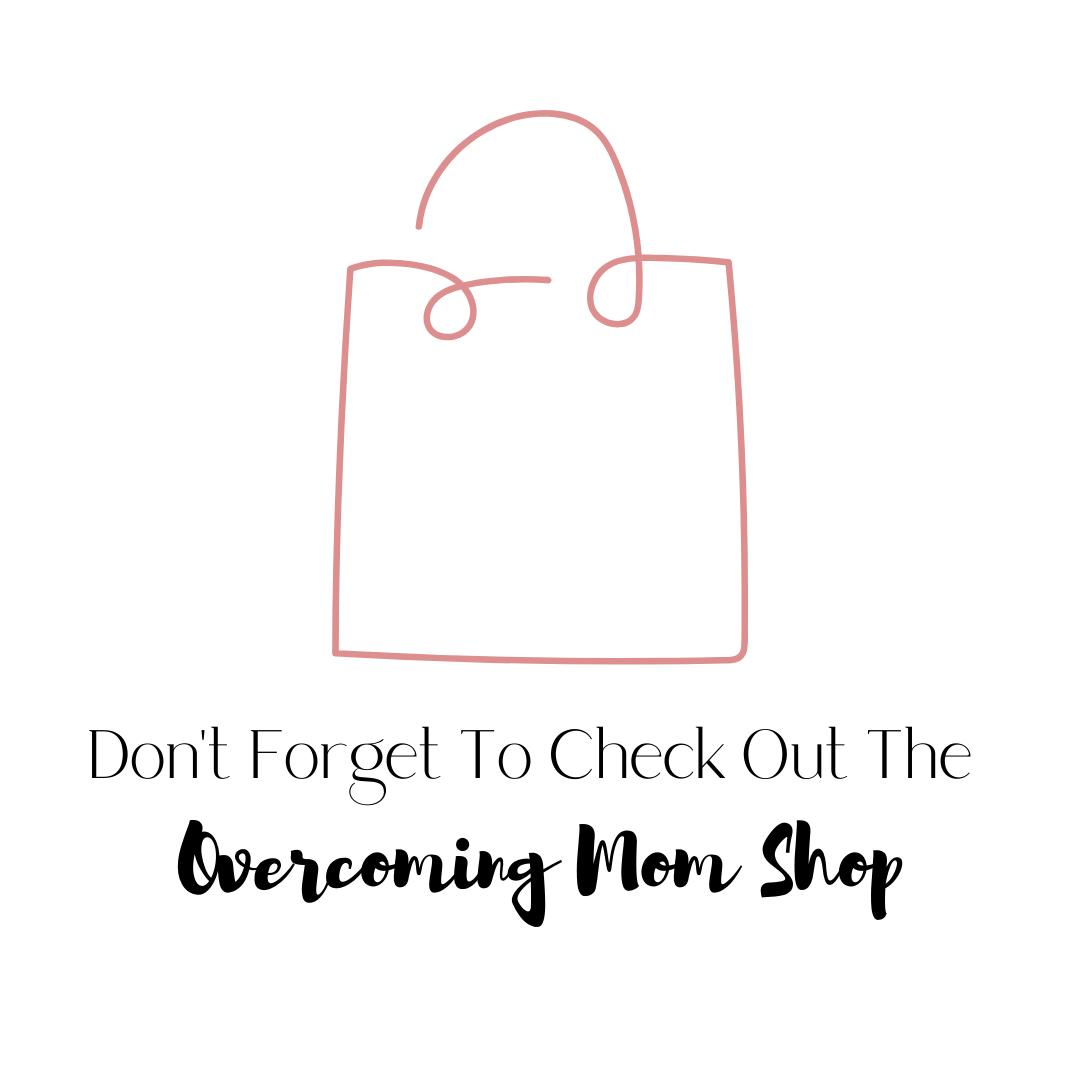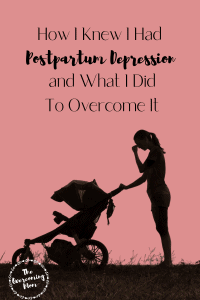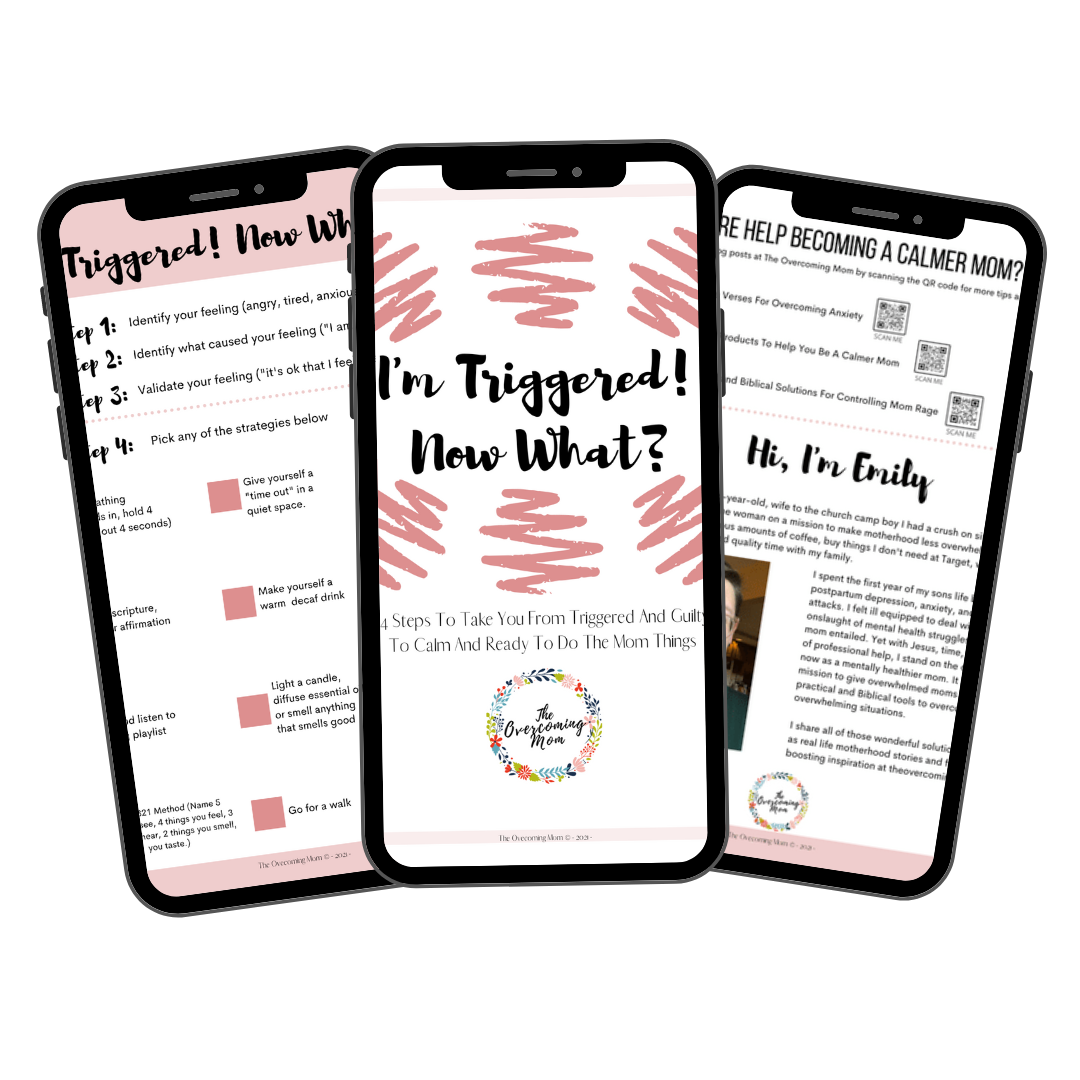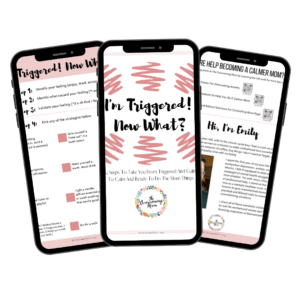This page may contain affiliate links. As an Amazon Associate I earn from qualifying purchases. If you want more information, please see my Affiliate Disclosure.
This post was originally published on 1/19/2020.
There were many things I was warned about when I became a mother. I was told there would be little sleep, little time, and little peace and quiet. At the time, I was a music teacher who already had little peace, quiet, time, and sleep. So the notion of throwing a baby in the mix didn’t seem like it would wreck me as much as it did. Nobody prepared me for the onslaught of emotions and mental health struggles that came with bringing my first tiny human in the world. Looking back on this, I wish desperately that I could have warned my old self of the possibilities, and potentially help her get help sooner.
When I finally started being honest about how I felt to family and friends, all I wanted to hear from them was, “Wow, sounds like you might have postpartum depression, what can we do to help?” But unfortunately, the minute I opened up my mouth about how I felt, I was barraged with horrible advice, such as these:
- “You just need to sleep. Being tired messes you up. Sleep when the baby sleeps”
- “It’s just your hormones.”
- “You just wait until they’re older, you won’t even know what tired is!”
- “It’s just baby blues. I felt sad for like two weeks after I had my kids too.”
- “Be a stay at home mom, you’ll be happier”
- “Go back to work, you’ll be happier!”
- “Don’t forget to have lots of sex with your husband as soon as you can, do all the laundry and dishes, eat perfectly nutritious meals, get a hobby, start a side biz, and don’t you dare take a break!”
Of course the last point was a bit exaggerated, but the sentiment was the same. I got everything but good advice! At 3 months postpartum, I self diagnosed myself with “baby blues,” but I was so wrong. With time I came to know what was really going on with me. It’s my hope that in sharing my story and words of wisdom, you will begin to take steps in the right direction and start seeing true healing in your postpartum life.
It’s more common than you think
According to Postpartum Support International, 15% of women experience significant depression after childbirth. That percentage goes up for women in poverty, and doubles for teen moms. 10% of moms report having depression while pregnant. It is believed that those percentages are on the lower side because there are so many women who are undiagnosed or misdiagnosed. Unfortunately, that means there are women out there who are like me, trying to white knuckle it through postpartum depression in denial or totally unaware.
I wish I would have stopped the denial sooner. But when I finally came to the conclusion that I was not ok, the Lord began to reveal to me that these feelings were not your average baby blues:
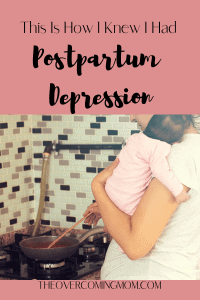
How can you tell the difference between baby blues and postpartum depression?
The first noticeable difference between postpartum depression and baby blues is the frequency it occurs amongst women. About 50% of women report experiencing baby blues, while about 10-20% of women report experiencing postpartum depression. How we notice the difference between the two in our own personal life depends on the symptoms, the frequency and severity of the symptoms, and how it effects our daily life. I wrote a post all about the misconceptions around postpartum depression called, “5 Myths About Postpartum Depression We Need To Stop Saying.”
The typical symptoms of baby blues are:
- Mood swings
- Anxiety
- Sadness
- Irritability
- Feeling overwhelmed
- Crying
- Reduced concentration
- Appetite problems
- Trouble sleeping
Baby blues are typically considered mild symptoms at best. These symptoms will typically onset a few days or weeks after birth, and will subside relatively quickly.
On the other hand, the symptoms for postpartum depression look like this:
- Depressed mood or severe mood swings
- Excessive crying
- Difficulty bonding with your baby
- Withdrawing from family and friends
- Loss of appetite or eating much more than usual
- Inability to sleep (insomnia) or sleeping too much
- Overwhelming fatigue or loss of energy
- Reduced interest and pleasure in activities you used to enjoy
- Intense irritability and anger
- Fear that you’re not a good mother
- Hopelessness
- Feelings of worthlessness, shame, guilt or inadequacy
- Diminished ability to think clearly, concentrate or make decisions
- Restlessness
- Severe anxiety and panic attacks
- Thoughts of harming yourself or your baby
- Recurrent thoughts of death or suicide
Postpartum depression can onset early, but vary in the severity and how long symptoms last. Some women don’t experience an onset of symptoms for up to a year after having their baby.
As a disclaimer, do NOT use these lists as a means to self-diagnose yourself. If you are concerned in any way that you may have a perinatal mood disorder, contact your doctor.
Even with these lists though, some women will still find themselves in denial that there is a problem. For some women, they need to hear a first hand account of someone else’s struggle, and see how it mirrors in their own life, before they see that they may need help. Which is why I want to outline the top 5 signs that I noticed that I had postpartum depression.
How I Knew I Had Postpartum Depression
1- I equated cries with being a crappy mom
I measured the worth of my parenting by how many times my child cried, and not my response to the tears. I somehow convinced myself that if my child cried, it was a reflection on whether I was doing a good job or not. Boy was I totally wrong!
If you’re finding yourself triggered by cries, I’d like to let you know that is completely normal. Baby cries are triggering, and that’s not a reflection on being a poor mom, that’s a reflection of your nervous system being overloaded. My son also had acid reflux, so the cries were very intense.
You’re not a crappy mom when you’re triggered by cries. If you’re finding yourself getting very upset when you’re baby cries, I urge you to just put your baby down in a safe place (such as their crib) for a little bit, walk away and take some deep breaths. Remind yourself that cries are a normal part of child development. The amount your child cries is not a direct consequence of your ability to parent, its a consequence of your child growing and communicating.
Find an affirmation or a mantra to say to yourself in those times, such as:
- I’m not a bad mom, my child is having a hard time.
- Cries don’t equal failure, they equal growth.
- I am capable of being a good parent. Right now is hard and that’s ok.
When your child cries, remember it’s not a reflection on your ability to parent. Be kind to yourself.
2- I was having panic attacks without knowing they were panic attacks
Panic attacks don’t look the same in everyone. Most people believe panic attacks are just hyperventilating and rocking back and forth in the fetal position. Yes, I did that. A whole lot.
But I also screamed at my husband a lot. I obsessively cleaned the kitchen. I threatened to leave and never come back. Each one of those moments my heart would race, my vision would blur, I felt like I could die at any moment.
All of those things are signs of panic!
Please don’t just think you’re being emotional. Please, when those moments happen, do NOT write them off as being an overly emotional new mom! Overly emotional new moms do not obsessively clean the house in a state of panic when things are going wrong. Overly emotional moms do not scream at their husbands because they breathed incorrectly. If something about your recent behaviors seems off, more than likely it is.
3- Decision fatigue was paralyzing me
I always felt like I was making the wrong decision. Google really didn’t help.
For example, I remember the night that dreaded 4 month sleep regression hit us! It was ONE DAY after returning to work. That first cry happened 45 minutes after we put him down. My husband looked over at me and said, “What do you want to do?”
I immediately lost it. The heavy breathing started happening, my chest began to close in, and the ONLY thing I was thinking was, “I don’t know!”
As someone who is typically a decisive person, I found myself paralyzed with the fear of decision making. Every decision felt like a life-or-death matter.
In retrospect, I realize now what I was experiencing was postpartum anxiety. Interesting enough, postpartum anxiety is considered more common than postpartum depression. Of course, having some levels of anxiety after having a baby is normal, but if it’s causing you to not be able to function day to day, then that’s a sign you may need to seek out professional help.
4- Mom guilt, but worse
It wasn’t that I didn’t love my son. Oh my goodness, I loved him more than the air in my own lungs. But I hated MYSELF! Many women read the list of postpartum depression symptoms and zero in on the symptoms that are directed towards your thoughts of your own child. When they do that, they immediately write off the possibility of having some kind of perinatal mood disorder simply because they feel love towards their child(ren).The truth is that most women with postpartum depression don’t report thoughts of harming their children, they mostly report thought of self harm.
Once upon a long ago, the only comparisons in parenting we could make was to our own parents or people within our friend circles. If you had supportive family and friends, you were probably better equipped to let go of self deprecating thoughts and be more kind to yourself. Nowadays, we get to compare our parenting journey with pretty much the entire world thanks to social media! Social media comparison is literally a breeding ground for guilt!
I’m going to give you 3 quick points to combat mom guilt right now:
- Don’t compare your postpartum journey to someone else’s highlight reel.
- You’re not the only one having a hard time, just nobody else is telling you they are too.
- Guilt takes lies and convinces you they’re facts. If it doesn’t sound true (such as the thought “everyone else is doing better than me”) then question that thought.
To put it plainly, tell guilt to shut up!
5- I pushed my support systems away
Communication with loved ones can change after having a child, but intentionally pushing people out of your life is typically a dangerous coping mechanism. I found myself frequently choosing not to communicate, even when I was available to.
Like many couples, my communication with my husband changed dramatically in those early days of parenthood. Meaningful conversations were tossed to the side and replaced with “where’s the bottle?” or “has he pooped today?” Those changes in communication are definitely normal, but after several months of survival communication I found myself shoving away his desires for communication and opting for isolation and mindless phone scrolling.
This also carried over into my friendships. Though I was lucky to have friends check in on me, I started intentionally ignoring text messages and phone calls. Even though I was able to attend church functions, I chose not to. I made excuses to not see family, even though I have a wonderful relationship with my family.
It wasn’t that I couldn’t have my support systems around, it was that I felt I didn’t deserve them. My desire for meaningful connection with like minded people who loved me got drowned out by my intense desire to disappear. Looking back now, I see I was using isolation as a coping mechanism to deal with trauma. I think if I had opened up sooner, I could have seen progress in my healing journey earlier.
How I Overcame Postpartum Depression
Before I share my journey through postpartum depression, I should disclose that my healing journey should not be a be-all-end-all on how YOU should do things. I share this part of my life as a means to show you that it IS possible to find the light at the end of this dark tunnel. Your path through the tunnel may look much different than mine, and that’s fine. It is my hope that sharing how I overcame postpartum depression will inspire and motivate you to get help and be more kind to yourself.
1- I got professional help
I’m a Christian, and unfortunately I heard many sad stereotypes and stigmas about getting professional psychological help. Unfortunately, listening to those lies kept me from seeking help when I should. When I finally decided that getting help was no longer an option for me, I learned quickly how incredibly wrong I was about my preconceived notions of Christians and mental health. I write more about this in my blog post, “Should Christians Go To Therapy?”
It was hard for me to accept that I needed professional help. It honestly bruised my spiritual ego. I found myself saying, “But the Bible says my help comes from the Lord, not a therapist!” But it is saying something when I am in the midst of seeking help from the Lord, and you hear that tiny whisper deep in you say, “You need to see a therapist.”
In my humble opinion, getting professional help is a non-negotiable if you believe you might have postpartum depression. If you don’t know where to even start with getting professional help, I highly recommend going to Postpartum Support International. They have a database of licensed professionals from all over the nation, as well as a variety of online support groups.
If you are a Christian and you are questioning whether therapy is right for you, please check out my blog post, “Should Christians Go To Therapy?”
2- I gave social media a break
Like I mentioned earlier, a major contributor to mom guilt is comparing yourself to moms on social media. When I realized that I was comparing my entire life to someone else’s highlight reel, I saw that I was setting up an unrealistic expectation for myself.
So I made a conscious effort to cut back on my social media time. I chose to unfollow social media influencers who made me feel inadequate, and found a small handful that didn’t. I learned that when I’m stressed, it’s unhelpful to mindlessly scroll and more helpful to listen to myself and find something more mindful to do.
When I minimized the voices of a thousand people giving contradicting advice on social media, I found myself listening to my own cues better, as well as the needs of my son and husband. When I cut out the voices of people not a part of my every day life, I started hearing the needs of the ones in my life more clearly.
3- I went trigger hunting
When you have a big reaction to a stressor, it is typically a sign that there is a need that is not being met in your life. For example, if you feel sudden bursts of anger when your child cries, it’s not a reflection of you being a bad angry mom, it’s a sign that your emotional bucket is about to overflow.
Let me give you a personal example:
I discovered on the days when I woke up early and had time to drink coffee in silence, I always had a better day. The days when I’d start the day rushed, stressed, and uncaffeinated, I almost always ended the day with a panic attack. I learned that feeling rushed in the morning was a major trigger for me.
When you start to feel anxious, depressed, or overwhelmed, take some time and ask yourself these questions:
- What am I feeling? (name you feeling)
- How does it make my body feel?
- What were the series of events that led up to this moment?
- Is there anything I can actively do next time to potentially prevent this from happening again?
Sometimes there isn’t anything you can do to prevent that trigger from happening again, and that’s ok. For example, you’re probably not going to be able to keep your baby from crying ever again, but you CAN validate how it makes you feel! Even simply validating your feelings can be key to moving past the triggering moment in a calm and peaceful way.
4- I got back into my faith, but left the guilt behind
When I first started feeling the stings of postpartum depression, I found myself incredibly bitter at God. Naturally, this caused me to walk away from my faith, even though it has been an intricate part of my life for many years. Many times during my postpartum depression battle, I found myself attempting to pray or read my Bible, and I immediately felt guilty. I had the double whammy of feeling like a bad mom and a bad Christian.
I realized through my work in therapy that I was viewing my faith as a performance and not as a part of who I am.
Think about it like this: Do you know your name? How do you know your name? Is it because you did all the right things to earn that name, or is it because it’s just who you are? I don’t have to convince anyone that I am Emily, I know I already am.
I don’t need to convince God of anything, He already knows who I am. So why feel guilty when I don’t live up to some standard that He didn’t even create for me? I don’t need to perform for God, I just need Him as an active part of my life.
This epiphany allowed me to start praying, reading the Word, and worship without guilt. I could be exactly who I was in the moment with Him, even if I was a hot mess. Having that peace meant everything to me, and still does.
If you’re a new mom and have NO IDEA where to start when it comes to studying the Bible, check out my blog post, “7 Practical Ways Busy Moms Can Study The Bible.”
Postpartum Depression Doesn’t Have To Get The Last Word
My dad, who is a recovering alcoholic, used to say this Shakespeare quote all the time when he was fresh out of recovery: “This too shall pass.”
I know dealing with postpartum depression can feel like a never ending battle, but it will pass. It is my hope in sharing my story with you that you don’t delay your healing journey like I did. You deserve to live your early days of motherhood with joy.
If you are wanting to get help for postpartum depression, but don’t know where to start, I highly recommend talking to your primary care physician first. Postpartum Support International also has a database of licensed professionals for your area as well as various support groups.
If you are in deep emotional distress or in a crisis and need immediate help, please call the National Suicide Hotline at 800-273-8255


